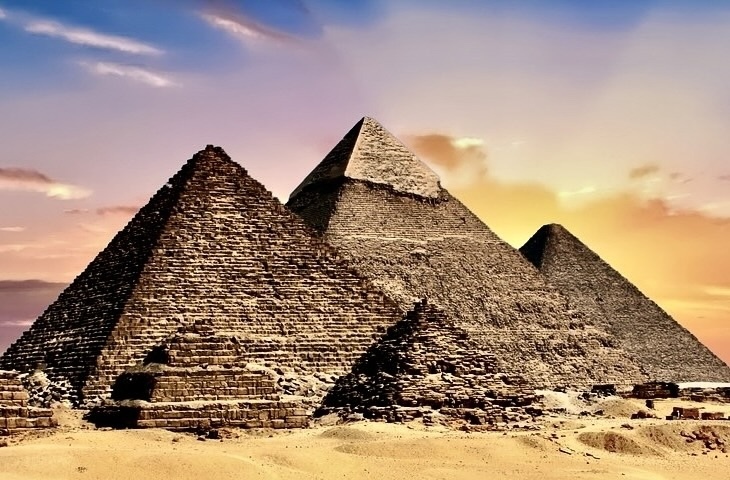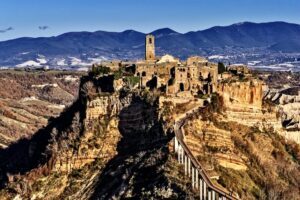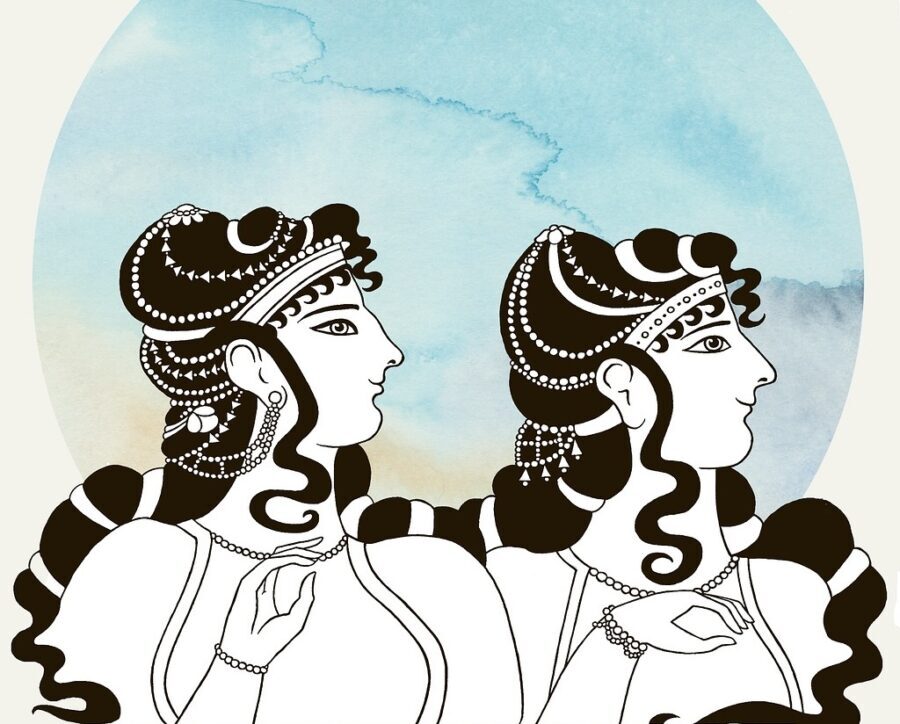
What follows is an interview of Professor Paul Cartledge by Richard Marranca relating to the culture and history of Sparta, an ancient Greek city-state that has fascinated many across the world for centuries. Here is what we know about the Spartans from the perspective of a world recognized scholar who has studied this ancient people for decades:
___________________________________
RM (Richard Marranca): Is there much archaeology being done at Sparta now? What’s left of ancient Sparta?
Yes, much – typically rescue excavations in and around Sparta, but the modern town of Sparta (1834) was built smack on top of the ancient, so there’s not much left to get at easily.
RM: From your brilliant and comprehensive book, The Spartans, I read that Sparta wasn’t much of a built-up city with an urban center, like Athens and other city-states (poleis). For most of its history, it had no wall. Where was Sparta located and who were the patron gods? What did it look like? And can you give us some of the demographics on Sparta?
Thucydides said Sparta was settled in an ancient, pre-urban manner – by ‘villages’ (komai), of which there were 4, plus – at a distance of some 5km – Amyklai. There was no city wall until the 3rd century BCE, and you’re right, by then it was a sign of Sparta’s weakness. Sparta had one patron god(dess): Athena. Her surname Poliachos (‘City-holder’) was alternatively Chalkioikos (‘of the bronze house’) because the walls of her official 6th-century temple on the ‘acropolis’ was adorned with bronze plates probably on the inside walls (maybe designed or fashioned by a local man named Gitiadas). Demographics: perhaps as many as 35,000-40,000 Spartans (men, women and children) citizens by c. 550, perhaps 30,000 in 480, then after the 460s a steep decline to just over 1000 adult male citizens in the late 370s. Besides Spartans, there lived within the bounds of the Spartan state (huge – max 8400 km. squared) two other population groups: local free Greek Perioikoi (about 50 communities – if of average size, about 75,000 adult male citizens in all) and Helots (unknowable – a guesstimate would be 100,000 men women and children, i.e. about 3 times as big as the Spartans).
________________________________
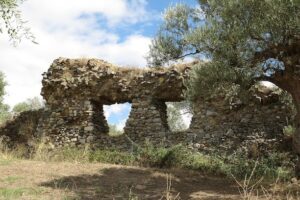
A section of surviving wall that surrounded Sparta. StanTravels, Creative Commons Attribution-Share Alike 4.0 International, Wikimedia Commons
________________________________
RM: What are some of the main factors that created this unique and highly successful culture and war machine? And whether real or not, who was Lycurgus?
Factors: topography, geopolitics – the Spartans managed to acquire easily the biggest city territory in all Hellas, all the Greek world, a territory protected by difficulty of access from without and within by the Taygetos mountain chain. After finally conquering and incorporating Messenia, by 600 BCE, elite aristocratic Spartans came to a compromise with ordinary poorer Spartans to adopt a common, self-denying, communally oriented lifestyle, including Greece’s only compulsory educational cycle for all (agoge), and a strong military orientation – to keep the Helots in their place! Lycurgus: probably at least semi-fictional ‘lawgiver’ to whom most of Sparta’s historical institutions including the agoge were credited. I personally think of him as a convenient fiction.
________________________________
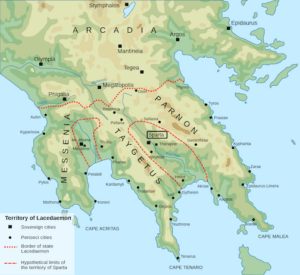
Map showing the ancient territory of Sparta. Marsyas, Creative Commons Attribution-Share Alike 4.0 International, Wikimedia Commons
________________________________
RM: Can you tell us some key aspects of the political system of Sparta? You have chapters on the great leaders in Spartan history. Can you tell us about a few?
Political system: there’s great controversy over how precisely to define Sparta’s ‘constitution’, as it had strong elements of kingship, aristocracy and a sort of quasi-democratic equality. Basically I’d say it was a peculiar kind of aristocratic oligarchy, i.e. ruled top down but requiring popular assent to the decisions taken in advance by the elite (esp. Gerousia + Ephorate).
Great leaders: 2 kings, 2 commoners: Kleomenes I (r.c. 520-490) – most powerful mainland Greek figure of his day, key to beefing up Greek/Athenian resistance to Persia in late 490s but died – murdered? – in odd circumstances. Agesilaus II (b. c. 445, r. c. 400-360): ditto, failed in Asia but succeeded in getting his hardline, pro-oligarchic policy implemented throughout Peloponnese. He failed in the end, however, versus Thebes and Athens, and was a major cause of Sparta’s precipitous decline in the 360s. Brasidas (flourished 431-death in 422): served as ephor and as commander of both the land-based commando force in 425 and of a major allied army in 424 to keep Thessaly from going over to Athens in the Peloponnesian War. He died in winning a battle in 422 that successfully kept the key northern strategic base of Amphipolis in permanent revolt from its founder Athens. Lysander (c. 450s to 395): the older lover of adolescent Agesilaus, came to prominence as a victorious naval commander at the end of the Peloponnesian war, securing massive Persian financial support. He failed in an apparent attempt to have the kingship thrown open to families besides the Agiads and Eurypontids, but crucially backed Agesilaus in the disputed royal succession within the Eurypontid house, then fell out with him later in a big way and died at Haliartos in the imprudent invasion of Boeotia.
RM: Can you explain the education of boys – leaving the home and going into the barracks and the rigorous education and all that – as you mention in The Spartans: “the compulsory and communal educational system known as Agoge or Raising/Upbringing.”
Agoge: As mentioned, it was unique in all Greece – and for that reason commended by both Plato and Aristotle, but also heavily criticized by Aristotle for being excessively military, producing citizens more like wild beasts than civilized! It was, I believe, a repurposed and comprehensively redefined version of male maturation rituals, principally adolescent, designed to ease and mark transition from boy (pais), lad (paidiskos) to man (anêr), hence the inclusion (I believe) of a pederastic dimension (Agesilaus nb went through the agoge, with Lysander as his love).
____________________________________
Advertisement
____________________________________
RM: How did Athens and other democracies differ from Sparta?
Let me count the ways… but first I must make clear that Athens was exceptionally – not normatively – democratic. Sparta had kings (very very un-democratic) and an aristocratic Gerousia (senate). Athens had no kings, had a pre-deliberative Council of 500 (chosen by lot), and a decision-making Assembly. At Athens, most offices were filled by lot – the democratic way. Sparta had no sortitive offices – all offices were filled by election (and a very undemocratic sort of ‘popular’ election – ‘childish’ according to Aristotle). Athens had a popular judiciary (all juror-judges chosen by lot) a key part of its function being to act as a second sovereign body checking on, i.e. either overturning or corroborating, decisions of the Assembly. There were perhaps as many as several hundred other cities which had some form of ‘democratic’ constitution but all of them were less democratically developed than those of Athens.
RM: Who were the helots? Did having a huge local slave class under its heels give Sparta a bad reputation in Greece? Did it also encourage Spartan xenophobia and provincialism? I guess I’m asking, what were the benefits and detriments of controlling the helots for so long?
Helots: Scholars differ over when Helots became helotized, and over whether all Helots – Messenians and Laconians – were Helots on the same terms, and over what those terms precisely were! I’d say they all suffered the same terms and conditions – ultimately they all lived under threat of being judicially murdered on grounds of being enemies of the state – and that those terms and conditions had been established by 600, if not soon after. They worshipped the same gods as their Spartan masters, they spoke the same dialect of Greek, they were allowed – unlike slaves proper, e.g. in Athens – to have families (wives, children). But they had no personal or political freedoms: ‘Heilotai’ means ‘captives’, i.e. war-captives, and that’s ultimately how the Spartans treated them all in law. But some (Messenians) felt their loss of freedom more and were more hostile than other Helots, some (Laconians) actually lived in the homes of their Spartan masters and mistresses as domestic servants, and no doubt some of them enjoyed quite good personal relations, just as some of them were probably treated quite brutally (cf. house slaves in the Old US South). Spartan men had sex with female Helots, hence a category of ‘halfbreeds’ called mothakes.
The benefit of having a slave class of Helots was – quite simply – having a state of the Spartan type, at all, since the Helots were the basis of it – economic and cultural. They were the basis of Spartan military might – until the Peloponnesian War, and especially in the 370s, when they became a liability—their hostility exploited as such, especially by the Thebans who liberated the Messenians in 370/69. That was the end of Sparta as a great power.
Xenophobia: the Spartans were indeed exceptionally xenophobic, partly for security reasons (ditto their treatment of the Helots). They conducted periodic ‘expulsions of xenoi’.
RM: So, the helots made it possible for the Spartans to focus on preparing / conducting war; even Spartan women seemed to benefit from freedoms that Greek women of that time didn’t have. So, they had more time to exercise and be healthy and raise great warriors?
Spartan women: see my article in Classical Quarterly 1981, in my Spartan Reflections collection (2001). They were indeed freed – by their Helot maidservants – from having to perform the routine tedious daily chores performed by ordinary free Geek citizen women elsewhere (cooking, clothes-making, housecleaning etc). As adolescent girls, they ate more than other Greek females of their age, and they exercised more, and publicly (i.e. were less closely chaperoned).
RM: I recall two women that you mentioned in your book, Gorgo and the royal woman, Cynisca, who won horse races at the Olympics. Can you tell us about these two and others that are extraordinary?
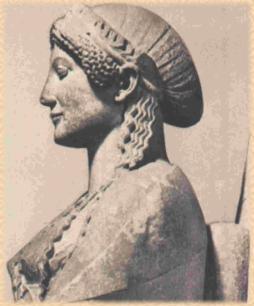
Gorgo, Queen of Sparta. Helena P. Schrader, Creative Commons Attribution-Share Alike 4.0 International, Wikimedia Commons
Those two are the only Spartan women (before the 3rd century BC) about whom we know anything much, and they certainly were extraordinary, apart from being royals. Gorgo: daughter of a king (see Kleomenes I above) and wife of a king, Leonidas (Kleomenes’ half-brother) of Thermopylae fame. Clearly very intelligent – see her two mentions in Herodotus. Cynisca: as her prizewinning epigram at Olympia (396 BC) boasts, she was the daughter of a king (Archidamos II – see Thucydides) and full sister of a king (Agesilaus) and half-sister of another, older king (Agis II). She was the first woman to win an Olympic crown (owning, not driving a 4-horse chariot) but opinions differ whether it was her idea – or Agesilaus’s – to go seriously for that sport, normally the preserve of men, including Spartan men.
RM: How did the girls grow up? Did they study? Did they have a good diet and was that for eugenics? You also mentioned the Spartan fondness for dance – did it have a purpose or just for pleasure?
See the article mentioned above. Eugenics, yes, in the sense that the Spartans wished to minimize maternal death in childbirth and not in the sense of wishing to produce a ‘master race’ in a Nazi sort of way. Dance: yes, the Spartans – men as well as women – were very keen on dance (choros in Greek) and devised many native dances. Among them were dances for nubile adolescent girls on the threshold of marriage (c. 17 or 18) called parthenoi, hence e.g. the Partheneia (songs composed for them to sing and dance to, by Spartan Alcman c. 600 BC).
RM: You mentioned the ‘Sayings of Spartan Women’. Can you elaborate on that?
Plutarch (c. 100 AD/CE) made a collection of such Apophthegmata (as he did one of Spartan men, and one of Greek kings and commanders). Sparta famously produced ‘laconic’ speech. Gorgo has some ‘Sayings’ attributed to her in Plutarch’s collection. Not all such Sayings are authentic.
_______________________________
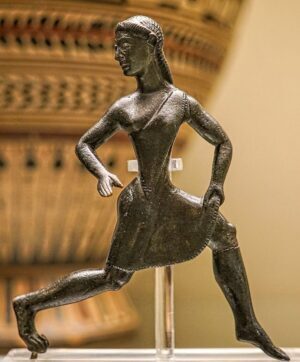
Bronze figure of a running girl, 520-500 BC. Spartan. Caeciliusinhorto, Creative Commons Attribution-Share Alike 4.0 International, Wikimedia Commons
_______________________________
RM: I recall that Pericles’s Funeral Oration evinces disdain for the Spartan system – it’s lack of freedoms and culture. What was Pericles’ overall message and critique?
His overall message was that democracy is good and the Spartans didn’t have it. Instead, they had to be coerced into being brave rather than being brave by free, educated choice. Of course the contrast was overdrawn.
RM: Did Sparta influence Plato in his writing of The Republic (the first study of an ordered society)?
Yes, heavily – also the later Laws. But Plato was not a slavish follower or advocate of Spartan mores. The Spartans would not have begun to understand either his philosophical argument or the education program he prescribed for the Guardians of his Ideal City.
RM: In my literature classes last semester, I had the students look at Aristophanes’ Lysistrata, so I was especially fascinated by your portrait of Lampito. Can you tell us about her? And might she be based on a real person?
Her name is a real Spartan name (mother or grandmother of King Archidamos II). But she needn’t have been based on any one particular Spartan woman. Her physique was a – comic – tribute to Spartan physical education. What mattered for Aristophanes was that she, a Spartan woman representing her city, was prepared to join the enemy – Athenian women – in declaring a sex-strike!
RM: Can you tell us about the Persians Wars? How did the Greeks defeat the Persians and what were the special qualities of Sparta, Athens and other Greek states that led to this incredible victory over the superpower, Persia?
Too big a question to be answered briefly! It took Herodotus a huge, massive book. Basically these are the key considerations/factors: (1) the resisting Greeks (only a little over 30 cities out of 700 or so in the Aegean region!!) were fighting for their homeland and families as well as for their own lives and political freedom, whereas the heterogeneous polyglot Persian army was a ramshackle, pick-up mob. (2) the resisters – especially Themistocles of Athens at sea – knew the terrain and their military capacity far better than Xerxes’ Persians. (3) thanks to Sparta and Athens agreeing to bury their differences and join in resistance, the morale of the resisting Greeks was far higher than that of the Persians, especially after Salamis.
RM: Do you have any favorite passages or themes in Herodotus?
I do: 1.207 (cycle of fortune); 3.38 (human communities develop powerful local customs, so powerful that each community thinks it’s always doing the ‘right thing’ even though the ‘right thing’ for one community might violently contradict the norm of another (e.g over cannibalism)); 8.3 (war is hell, civil war being worse than ordinary war against an external enemy).
RM: In The Spartans, you discussed the powerful “What if” – if the Persians had overtaken the coast of Asia Minor and the rest of Greece. That’s big stuff – a top ten. Would that have changed history?
Persia – Achaemenid Persia – did control its Asia Minor western seaboard and its Greek cities there for long stretches: c. 550-479, 386-330. The key moment, so far as Western and other history goes, was 479, the battle of Plataea. Had the resisting Greeks lost that one, well, probably there would have been no Athenian-led cultural revolution of c. 450-400, no Athenian democracy, no Socrates, no Plato, no Parthenon, no Sophocles, no Democritus, etc. Sparta, in contrast, gained no special cultural benefit and in the 460s suffered a catastrophic earthquake. Sparta’s victory in the Peloponnesian War therefore brought no cultural benefit – whereas the restoration of democracy at Athens in 403 did (Plato, Demosthenes, etc) as did the victory of Thebes at Leuctra (freedom for Messenian helots, extension of federalism to Arcadia…)
These would not have been inevitable, nothing in human history is strictly that, but quite likely! Thucydides had to try to answer the question: why did the Peloponnesian war happen at all (not only why it happened as and when it did), and why did the Spartans start it? His answer: the Spartans were convinced of three things: (1) that the empire of the Athenians constituted a threat both to their own alliance and ultimately to their own status and power and therefore they had no choice but to attack, (2) that they would win and quite soon/easily, and (3) that (partly because) the gods, especially Apollo, were on their side against the impious Athenians who had broken an oath-sworn treaty.
RM: In 370 BC the Battle of Leuctra shocked Greece. Can you tell us about this incredible game-changer? How did Xenophon report on this?
Xenophon, though an Athenian, was often pro-Spartan in his Hellenica (Greek history, 411-362) which was really a Peloponnesian history told from a Spartan viewpoint. He was so disgusted that the Spartans broke a solemn oath (cf. above) by invading and occupying Thebes in 382 that he believed the Leuctra victory of the Thebans in 371 to be divine retribution! Thebes won, actually, because of the military reforms engineered and presided over by the great Pelopidas and the even greater Epaminondas, and because the morale both of the Spartans themselves and of their allies was at a low point. The misguided foreign policy that resulted in Leuctra was essentially Agesilaus’s, but the commanding king who died was Cleombrotus. Xenophon says he was drunk. Sparta lost 400 out of 700 citizens present, about one third of their entire adult male citizen body.
So, Sparta went from top dog—for centuries—to losing its might and its helots. Other city-states, such as Thebes, gained the upper hand. Soon Philip and Alexander and the Successors conquered, followed by Rome. You mentioned that Sparta became a vacation spot and got obsessed with antiquarianism. Is it fair to say that Sparta got swallowed up by a changing world that it was not prepared for?
Yes that would be fair. Spartan temperament and ideology had always been conservative – by the 4th century it had become outright reactionary.
RM: Did Sparta remain a powerful image for others, including Romans? Even today there are towns and teams named Sparta and Spartans, etc.
Yes, indeed, to the extent that some Romans claimed they were related, even that they were descended from the Spartans. Yes in the early modern, neoclassical period hundreds of north Amrrican towns have ‘Sparta’ as or in their name, e.g. Sparta, Wisconsin.
RM: You ended your book with the chapter on Leonidas who many people know from his undaunted leadership at Thermopylae – and from the movie “300”, of course. What does this leader represent to Sparta, to Greece, to the world? You mentioned the admirations of Michel de Montaigne, Lord Byron, Cavafy and others. Should we be as impressed with Sparta as we are with Athens?
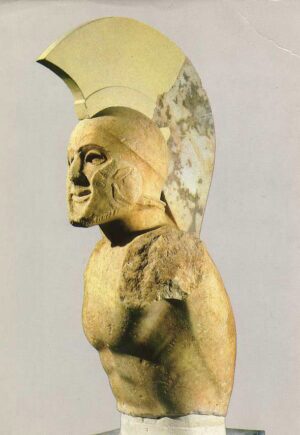
Marble statue of a helmed hoplite (5th century BC), maybe Leonidas, Sparta, Archæological Museum of Sparta, Greece. de:Benutzer:Ticinese, GNU Free Documentation License, Wikimedia Commons
I think Leonidas followed in his half-brother Kleomenes I’s footsteps – convinced that the Persians constituted a mortal danger not only to Sparta but to all Hellas, and that therefore they must be resisted militarily, wherever and whenever, at all costs (hence Thermopylae and his famous 300) – a view, however, that not all Spartans let alone all Greeks (viz esp. the Thebans!) agreed with. I believe he was even prepared to play fast and loose with an alleged Delphic oracle saying a Spartan king had to die or all Sparta would be destroyed….hence his own death. We should be mightily impressed with that sort of morale attitude – it made the key contribution, I believe, to the Greeks’ and especially the Spartans’ decisive victory at Plataea (see above) – but we should be equally or more unimpressed by the ‘dark side’ of Spartan society, the Helots.
_______________________________
About Paul Cartledge
Professor Paul Anthony Cartledge is a British ancient historian and academic whose field of study is Athens and Sparta in the Classical Age. From 2008 to 2014 he was the A. G. Leventis Professor of Greek Culture at the University of Cambridge. He was chief historical consultant for the BBC TV series The Greeks and the Channel 4 series The Spartans, presented by Bettany Hughes. Cartledge is also a holder of the Gold Cross of the Order of Honour of Greece and an Honorary Citizen of (modern) Sparta.
Cover Image, Top Left: EyeShotYou, Pixabay
_______________________________
Advertisement

Don’t miss out on this unforgettable evening as Dr. Hawass reveals the most closely guarded secrets of ancient Egypt and presents his groundbreaking new discoveries and latest research live on stage. As the man behind all major discoveries in Egypt over the last few decades and director of several ongoing archaeological projects, Dr. Hawass may yet surprise you with unexpected revelations that will make news across the world.
_______________________________
Advertisement


